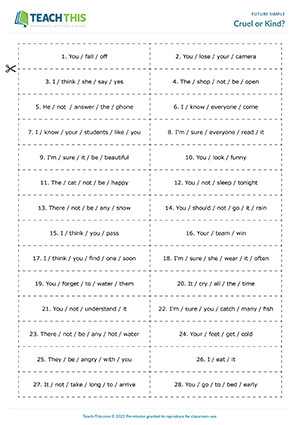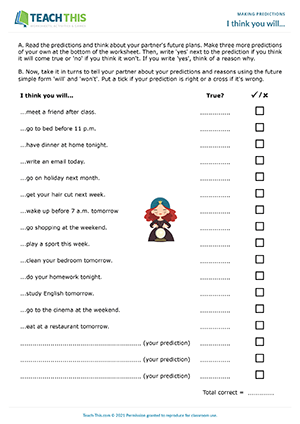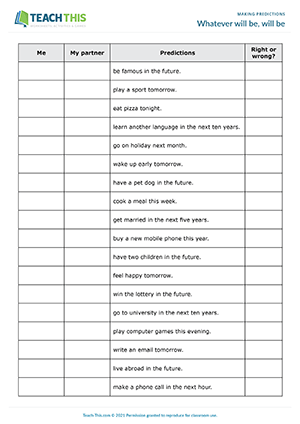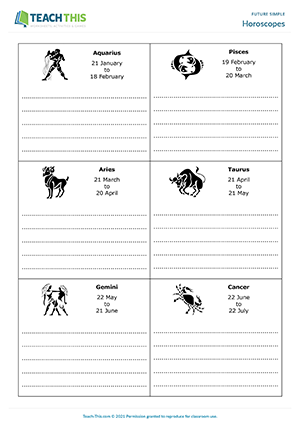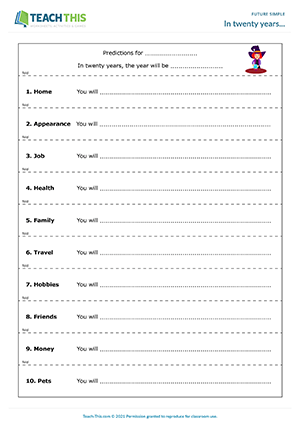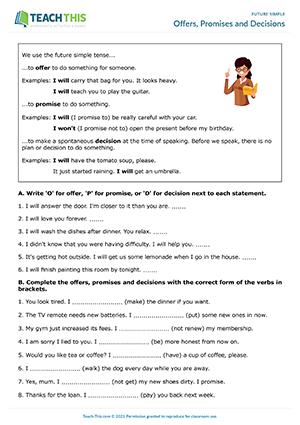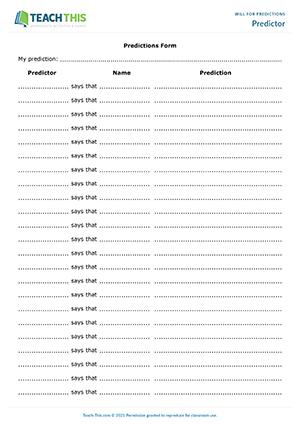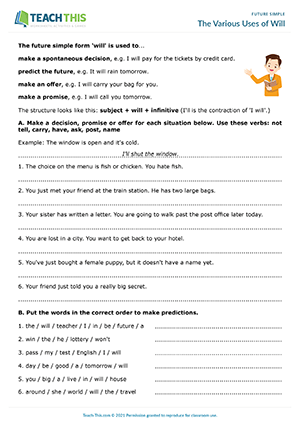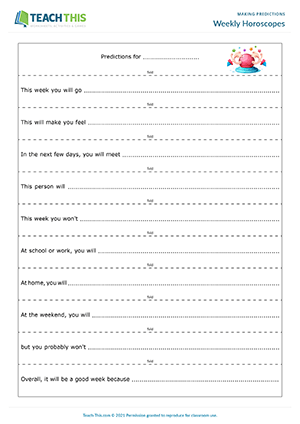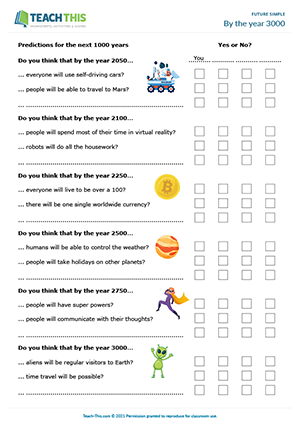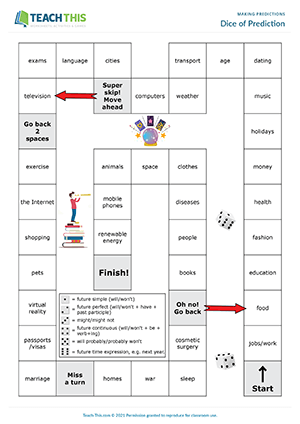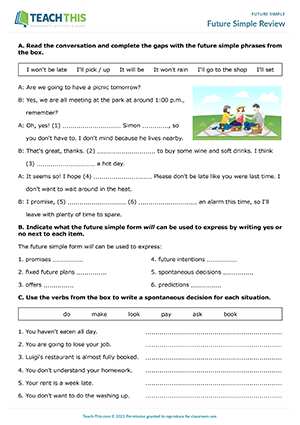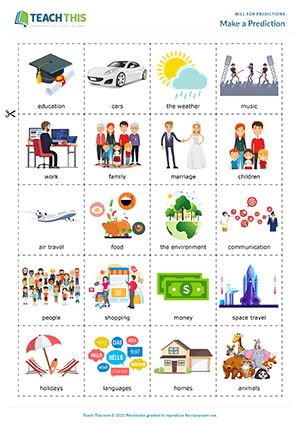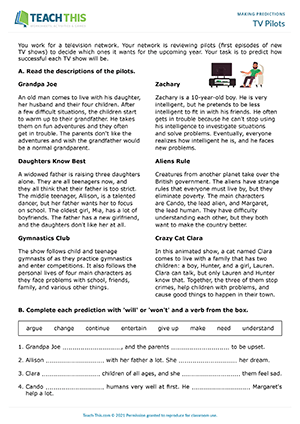In this engaging future simple game, students respond to statements by making positive or negative comments using the future simple. In groups, students take turns picking up a statement card, reading it aloud and placing it face-up on the table, e.g. 'I am going to write a book.' All the students then race to find a suitable comment card to respond to the statement. When a student finds a matching comment, they pick it up and use the prompt on the card to make a positive or negative reply using the future simple, e.g. 'I'm sure everyone will read it.' If the other students agree that the comment matches and uses the future simple correctly, the student wins and keeps the two cards. If not, the student is out of the round, and the other players continue to race to look for or make a suitable response. The game continues until all the statement cards have been matched. The student with the most cards at the end of the game wins.
Here is a free making predictions game in which students predict a partner's future using the future simple forms will and won't. The aim of the game is to make the most accurate predictions. In pairs, students read the predictions on the worksheet and write three more of their own at the end. Students then think about their partner's future plans and write 'yes' next to each prediction if they think it will come true or 'no' if they think it won't. If a student writes 'yes', they must think of a reason why. Students then take turns telling their partner about their predictions and reasons using the future simple form will and won't. Their partner tells them if their predictions are likely to be right or wrong. If a prediction is correct, the student puts a tick in the last column. If it's wrong, the student puts a cross. The student with the most correct predictions wins the game.
Here is a useful future simple worksheet to help students learn how to use the future form will and won't for predictions. First, students use prompts to write predictions with will and won't. Next, students make predictions negative using won't. After that, students put words in the correct order to make statements or questions predicting the future. Students then move on to match questions with short answers. Next, students change predictions into questions and write short answers. Afterwards, students write sentences predicting their own future with will and won't and then share their predictions with a partner. Finally, in pairs, students ask and answer questions about predictions.
In this enjoyable future simple game, students make predictions about a partner's future using will and won't. First, students read each prediction and write I will or I won't in the column marked 'Me', depending on whether they think the prediction will come true or not, e.g. 'I will be famous in the future.' Students then complete the same predictions for a partner by writing He/She will or He/She won't in the 'My partner' column, e.g. 'He will be famous in the future.' Next, students take turns asking Will you...? questions to their partner to find out if their predictions are right or wrong, e.g. 'Will you be famous in the future?' Their partner then gives their answer. If a prediction is right, the student puts a tick in the last column. If it's wrong, the student puts a cross. The student with the most correct predictions in each pair wins.
In this intriguing making predictions activity, students create horoscopes for their classmates with the future simple form will. In pairs, students predict what will happen by writing horoscopes for all the signs of the Zodiac with predictions for the following day or weekend. Students then display their horoscopes on the classroom wall. Next, students go around the classroom, reading the predictions for their star signs and making notes about the predictions. Two days later or after the weekend, students continue with the activity by re-reading their notes about the predictions. Students then tell the class about which predictions came true. Finally, students vote for the most accurate horoscope in the class.
In this imaginative future simple activity, students make predictions about what their classmates' lives will be like in twenty years using the future simple form will. First, students write their name and the year in twenty years time at the top of the worksheet. Students then fold their paper so the name and year cannot be seen and pass the paper to the student on their right. That student writes a prediction with will, folds the paper so their sentence is hidden and passes it to the student on their right. This continues until all the predictions have been written. When the students have finished, they unfold the worksheet and give the paper back to the person whose name is at the top. Students correct any mistakes they find and then read their predictions to the group. Students then discuss the predictions and decide who will have the most interesting life.
Here is a free future simple worksheet to help students learn how to use the future simple to make offers, promises and decisions. First, students read a set of statements and write 'O' for offer, 'P' for promise, or 'D' for decision next to each one. Next, students complete offers, promises and decisions with the correct form of the verbs in brackets. Students then move on to match statements with offers, promises or decisions. Afterwards, students read statements and write an offer or promise for each one. In pairs, students then say the statements to their partner and write their partner's offers and promises on the worksheet. In the last exercise, students make decisions based on the offers and promises written on the worksheet and write a sentence about each one.
In this creative will for predictions activity, students make predictions based on present observations and practice giving reasons with because. First, students draw the name of a class member from an envelope. The person whose name is on the paper is the subject of their prediction. Students then write a prediction about the person, giving a reason for their prediction. Next, in pairs, students write their partner's name in the 'Predictor' column. Students then give their predictions to each other, without saying who the prediction is about, e.g. 'This person will have a big family because she is great with children.' Their partner listens and writes down the prediction, leaving the name blank, e.g. '...will have a big family because she is great with children.' Students then pair up with someone else, and so on. This process continues until the predictions form is complete. Afterwards, students guess who the predictor is talking about in each prediction and write their guesses in the 'Name' column. Finally, students go around the class and find out how many of their guesses are correct.
Here is a comprehensive future simple worksheet to help students learn how to use the future simple form will for predictions, spontaneous decisions, offers and promises. Students start by reading through a grammar explanation explaining the functions of the future simple form will. Students then make decisions, promises and offers for the situations on the worksheet using the verbs shown. Next, students put words in the correct order to make predictions. After that, students match each sentence with a function of will. Students then move on to match statements with offers of help. Finally, students work with a partner and discuss ten predictions using useful language from a box.
In this rewarding future simple activity, students make predictions by writing imaginary horoscopes for their classmates with the future simple forms will and won't. First, students write their name at the top of the worksheet, fold the worksheet so their name cannot be seen and pass the paper to the student on their right. The next student completes the first sentence 'This week you will go...' with a prediction. The student then folds the worksheet so their sentence is hidden and passes it to the student on their right. This process continues until all the sentences have been completed. When the students have finished, they unfold the worksheet and give it back to the person whose name is at the top. This is their horoscope for the week. Finally, in groups, students take turns reading their horoscopes. Students then discuss the predictions and decide who will have the most interesting week.
In this future simple speaking activity, students produce and conduct a group survey of predictions for the next 1000 years. First, students read through predictions and add a third prediction of their own to each category using the future simple form will. Next, students put a tick in the box next to each prediction that they think will come true or a cross if they think it won't. After that, in groups, students ask and answer the questions from the worksheet, e.g. 'Do you think that by the year 2050 everyone will use self-driving cars?' Students note down their classmates' answers by putting a tick for 'yes' and a cross for 'no'. When the groups have finished, they write the results of their survey, e.g. 'Three people in our group think that everyone will use self-driving cars by the year 2050.' Finally, each group reports back to the class on their results.
In this free making predictions board game, students practice making predictions using the future simple with will and won't, the future perfect, the future continuous, future time expressions, will probably and might. Students take turns rolling the dice and moving their counter along the board. When a student lands on a square, they make a prediction about the topic, according to the number on the dice and its corresponding future form. For example, if a student rolls a '1', the student makes a prediction with the future simple. If a student rolls a '2', they make a prediction with the future perfect, etc. The other students in the group judge whether the sentence is grammatically correct. If it is, the student stays on the square. If a student makes a grammar mistake or cannot think of a prediction, they go back two squares. The first student to reach the finish wins the game.
In this productive future simple worksheet, students review the various uses of the future simple form will. Students begin by reading and completing a conversation with future simple phrases to demonstrate the various functions of will. Next, students indicate what the future simple form will can be used to express by writing yes or no next to each item. Students then use verbs from a box to write spontaneous decisions for situations. After that, students imagine that they are babysitting their neighbour's children. Students then use will to make promises to the parents about their instructions. Students then move on to use the future simple to make predictions about given topics. In the last exercise, students respond with an offer of help for each statement using the future simple.
In this fun future simple game, students play a card game where they make predictions about different topics using future time expressions. Players take turns turning over a topic card and making a prediction about the topic using one of the time expression cards in their hand, e.g. 'Jane will get married in the next ten years.' If the player has an empty crystal ball card, they can use any future time expression they like to complete the prediction. The other group members listen and judge the player's sentence. If they agree the prediction is appropriate and grammatically correct, the two cards are removed from the game and play passes to the next student. The first player to get rid of all their time expression cards wins the game.
In this theme-based predictions worksheet, students use the future simple to make predictions on how successful TV pilots will be. Students start by reading descriptions of six TV pilots. Students then complete predictions about the TV shows with will or won't and verbs from a box. Students then use question words and answers to write questions with will about the pilots. Next, students combine expressions of prediction and pilot descriptions to make predictions about the TV shows using will or won't. In the last exercise, students compare their predictions with a partner and discuss which pilots they think will be the most successful. Students then write sentences to explain their choices. Finally, have a class feedback session to find out which TV shows the students think will be the most successful and why.
Latest Free
Resources
- Everyday Objects Bingo
Everyday Objects
Elementary (A1-A2)
- Action Verb Races
Actions
Elementary (A1-A2)
- Birthday Basics
Birthdays
Elementary (A1-A2)
- Sales Phrasal Verbs
Business Phrasal Verbs
Upper-intermediate (B2)
Latest Member
Resources
- Collocations at Work
Business Collocations
Intermediate (B1)
- Etiquette Trivia Board Game
Etiquette and Manners
Upper-intermediate (B2)
- Everyday Objects Vocabulary
Everyday Objects
Pre-intermediate (A2)
- Let's have a talk
Verb-Noun Collocations
Pre-intermediate (A2)



